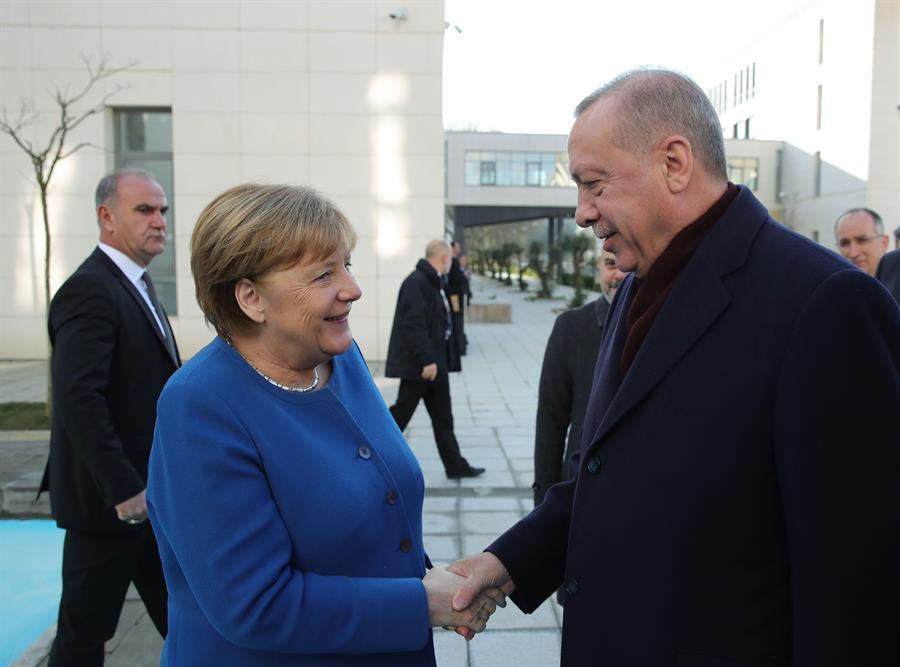Chaos in Libya may affect Mediterranean Sea region, Erdoğan says
ANKARA-Anadolu Agency

The chaos in Libya would affect the entire Mediterranean region if peace is not ensured as soon as possible, Turkey’s president said on Jan. 24 and urged international pressure to force the head of Libya’s eastern-based forces to abide by a tentative truce.
“If calm is not established as soon as possible, the atmosphere of chaos in Libya will affect all the Mediterranean basin,” President President Recep Tayyip Erdoğan said at the official opening ceremony for the Turkish-German University’s new campus in Istanbul with German Chancellor Angela Merkel.
The recent 55-article peace plan was an important step towards restoring political stability in Libya, he said, adding that the plan’s success depended on its implementation in the field.
“It is important to put pressure on putschist Haftar and his supporters, especially in this regard. Increasing attacks on civilian residential areas in Tripoli and the targeting of Mitiga Airport showed who was on the side of peace and who was on the side of continued blood and tears,” Erdoğan stated.
“We hope the international community will not make the mistakes it made in Syria,” he added.
On Jan. 12, parties in Libya announced a cease-fire in response to a joint call by the leaders of Turkey and Russia. But talks for a permanent cease-fire ended without an agreement after Haftar left Moscow without signing the deal.
On Sunday, Haftar accepted terms in Berlin to designate members to a U.N.-proposed military commission with five members from each side to monitor the implementation of the cease-fire. Missile attacks this week hit Tripoli’s airport.
Haftar’s forces, which control the east and much of southern Libya, receive support from the United Arab Emirates and Egypt, as well as France and Russia. Turkey supports the Tripoli-based government, which is also backed to a lesser degree by Qatar and Italy.
Turkish-German University
Erdoğan expressed hope that the Turkish-German University in Istanbul would be a symbol of friendship between the two countries.
“We will continue to give all kinds of support to the Turkish-German University,” Erdoğan stressed. Stressing that Turkey has become a hub for international students, Erdoğan said the number of foreign students has increased to 172,000.
He also said he expected that the country would become a center of attraction for foreign academics as well.
Erdoğan added that efforts were ongoing to establish a Turkish-Japanese university of science and technology, as well as a Turkish-Italian university.
Stressing that humanity faced many problems including terror, Islamophobia, cultural racism and xenophobia, he emphasized that no one should ignore these, particularly in such a period when communication and transportation have become so widespread.
During the opening ceremony ahead of bilateral talks between the two leaders, Erdoğan said they would discuss regional dynamics, regional issues, especially Libya, and two-way relations.
“Not only countries like us neighboring these conflicts in Syria for the last nine years have been affected -- Europe has also been affected,” he said.
‘Exceptional example of cooperation’
For her part, Angela Merkel also praised efforts towards the Turkish-German University. “The Turkish-German University is an exceptional example of cooperation, a symbol of the partnership between two countries,” said Merkel.
A total of 5,000 students will be expected to receive education from the Turkish-German University with the opening of the new campus, she added.
Ankara and Berlin signed an agreement in 2008 to establish the university.
She also emphasized that science and education have played an important role in promoting the creativity and freedom of people.
Stressing the importance of the civil society dialogue on politics and relations between governments, she said Turkey and Germany have deep-rooted relations that date back to history.
















